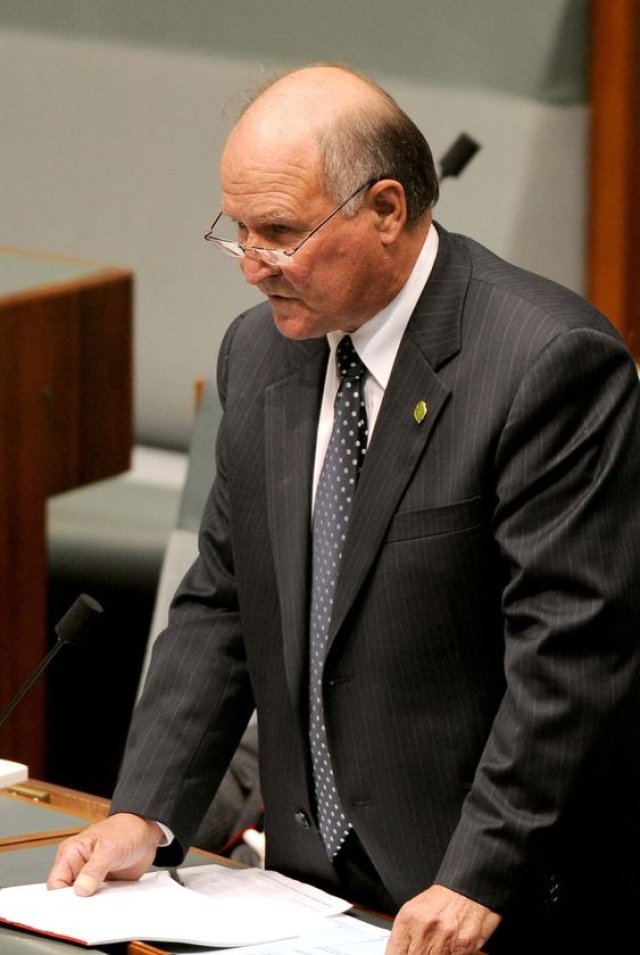
Voters’ stunning rejection of both major parties has left neither likely to form a government in its own right. Whichever party governs, it will have to rely on the support of at least three and probably four independents, with Andrew Wilkie's chance of taking Denison from Labor firming.
Unlike Wilkie, whose most recent affiliation was with the Greens, the three established independents, Tony Windsor and Rob Oakeshott from NSW and Bob Katter from Queensland, came from the National Party. They have been described as conservative independents, but on a raft of issues they are more progressive than the major parties.
Katter is perhaps the most ideological. On his website, he describes his motivation for leaving the National Party, which he represented in state and federal parliaments for 27 years.
Katter left the Nationals and ran as an independent in 2001, “due to his disenchantment with economic rationality that he felt the National Party was adopting”.
Katter opposed the sale of Telstra in 2003 and again in 2005. He opposed the sale of Medibank Private in 2006, lamenting the privatisation of the Commonwealth Bank, Qantas and other state assets.
“So whether it is the railways, Qantas or the banks, we got a dreadful deal out of privatisation. If Medibank Private is sold, I do not doubt for a moment that we will get the same sort of deal”, he said on November 2, 2006.
No one could accuse Katter of being an environmentalist. A noted climate sceptic, Katter also opposes legislation to protect the environment and grant Indigenous people native title. He has also expressed homophobic and sexist views.
Nevertheless, he has spoken publicly against the Northern Territory intervention. “The fact that they've had all alcohol taken off them, all pornography taken off them and they're going to have their money taken off them and handed to them — like they were little children — through a trust fund sounds good but in reality it is the most dreadful, discriminatory, repressive laws”, Katter told SBS TV's Living Black on September 10, 2008.
Windsor, independent MP for New England, has also stated his opposition to the intervention. “One of the reasons why I was opposed to the intervention in the Northern Territory is that a blanket approach such as that does not recognise the flexibility that is required”, he said on February 19, 2008.
Unlike Katter, Windsor accepts the science of climate change. “I believe that there is human induced climate change. I believe it is something that we should do something about. I am not one of the skeptics”, he told parliament on October 28, 2009.
However, he also opposed federal Labor's Carbon Pollution Reduction Scheme, arguing that the target of 5% reductions was “nonsense”. “It does nothing about the issue. It puts in place an economic structure which will achieve not much more than people stopping cleaning their shoes, in terms of saving emissions”, he said.
Windsor also opposed the sale of Telstra in 2002 and the bill to sell the Snowy Mountains Hydro-electricity scheme in 2006. “It was only the two independents ... who divided the parliament to vote against the sale as the Coalition and Labor parties crammed together to vote for its sale as they had done in the NSW and Victorian parliaments”, he said on August 5 this year.
The newest of the three independents, Oakeshott, is a former National turned independent in the NSW state parliament. He won the federal seat of Lyne in a by-election when former National Party leader Mark Vaile retired in 2008. He was a former shadow minister for the National Party in state parliament, but Oakeshott has taken some progressive stands.
Oakeshott has championed renewable energy. He criticised the Labor government for “browning down” renewable energy legislation, and in August 2009 demanded a national renewable energy feed-in tariff, to encourage investment.
Oakeshott has voiced some support for justice for Indigenous people seeking native title to land, and has noted the objections of the Australian Council for Social Service for the welfare quarantining aspects of the NT intervention. However, unlike Windsor and Katter, he has not publicly opposed it.
The strongest link between the three independents is their rejection of the Nationals, their former party. Styling themselves as defenders of the interests of farmers, small business and workers in the country, they oppose what they see as the destruction of services and the threat of deregulation and globalisation.
Whichever major party the independents ultimately decide to support to form a minority government, one thing is certain. On a wide range of issues, from climate change, to Indigenous rights, to economic policy, they are objectively to the left of both major parties. That will certainly make for an interesting parliamentary term.